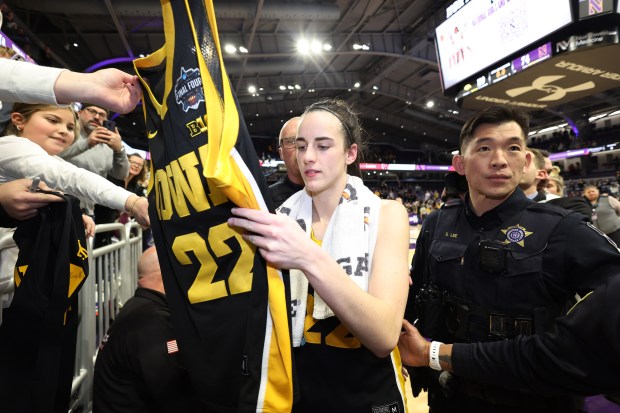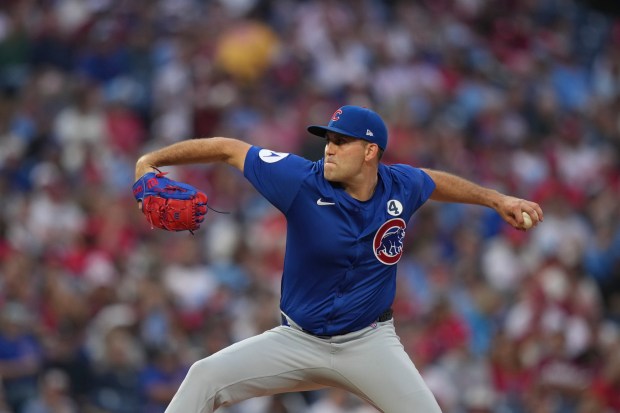When Caitlin Clark comes to town, it’s an event. Sold-out crowds, sneaking into side doors of hotels and police escorts.
Clark and the Iowa women’s basketball team are box office. Every game is a home game thanks to thousands of fans who created a sea of black and yellow at Hawkeyes games all over the country. When they made an appearance in Evanston on Jan. 31, one person told me, “she’s like the Beatles.”
“Every single game, I play and it’s all sold out. So it’s not something you ever take for granted. I think it’s kind of crazy people are screaming my name so much. It’s not something you really ever get used to,” Clark said after the 110-74 win over Northwestern.
When Ohio State upset Iowa a couple of weeks before, a record crowd of 18,660 was in attendance. With Clark in the building, Northwestern women’s basketball also broke their attendance record with an announced crowd of 7,039 — a sellout. Before Clark and her assigned police escort took the court for warmups, young children lined the bleachers alongside the entryway where she was expected to emerge. Dressed in Clark basketball jerseys and shirts down to their ankles, they waited with bated breath and smartphone cameras already recording to get an up-close view of the star.
“WE LOVE YOU, CAITLIN!” They screamed as she quickly walked to the court, seemingly unbothered by the piercing squeals.
Caitlin Clark entered Welsh-Ryan and the little girls went nuts. pic.twitter.com/d168lc08Ql
— shakeia (@curlyfro) February 1, 2024
Clark — the first player in NCAA Division I history to have 3,000 career points and 1,000 career assists, who is just eight points away from the NCAA women’s career scoring record — is projected to be the first pick in the 2024 WNBA draft should she opt to forgo her final year of eligibility. Though it’s not a subject she will talk about right now.
“The WNBA can wait. I’m just focused on college right now,” she said.
But even if Clark won’t indulge her growing fan base with a peek into what she could be thinking about her future, everyone else is talking. And while I find a lot of it interesting, one particular part of the discourse is the oft-repeated idea that she will take “a pay cut” to play in the WNBA.
That incorrect understanding likely comes from the new name, image and likeness deals in college athletics being thought of as a salary that somehow goes away when a player leaves school.
So to gain a better understanding, I spoke to an expert.
Noah Henderson, a professor of sport management at Loyola, is an expert on NIL who advises companies, schools and collectives on best practices. He said it’s common for women’s endorsement earnings to be greater than the salary they command in the sport.
“When NIL in college is conflated as a salary, it then tricks people into thinking athletes who earn more on their endorsement rights than their on-field salary will be taking a pay cut. That is categorically false, as in the pros you are able to have both,” Henderson said.
This argument also misunderstands NIL valuation, Henderson said. When you look at sites that show a player’s worth in the millions, it can seem that’s what a player is making to play the sport.
“A player’s NIL valuation is simply the amount of money they can accrue off of their publicity rights. While some players in college are making a ‘pay-for-play salary’ through NIL Collectives, this is virtually always reserved for male revenue athletes (football and men’s basketball),” Henderson said. “That is to say, all the money made by Clark is in the form of bona fide endorsement deals utilizing her as an influencer, not for on-court performance.”
The WNBA rookie pay scale means Clark will go from a $0 base salary to one slightly above $76,000. While there is room to discuss salaries within women’s sports, Clark’s future earnings as a WNBA star seem promising.
Aliyah Boston, who was selected by the Indiana Fever with the first pick in last year’s WNBA Draft, told Khristina Williams of Girls Talk TV, “Because you go to the league, that does not stop your NIL deals. You just fully call it endorsements. … These brands still want to follow you. Your fan base does not change.”
Clark is already signed with a list of household brands including Gatorade, State Farm, Nike, Buick, Topps and H&R Block. She also has a charitable endorsement deal with an Iowa community food pantry. If what we are seeing now is a sign of what’s to come, her fan base will grow along with her profile and Clark’s basketball career could be quite lucrative in the way of endorsement deals.
NIL deals have helped make women’s college basketball players household names and bringing in brands in ways the WNBA hasn’t been able to on its own with its marquee players should be a mutually beneficial thing.
With the increase in women’s sports fandom and the demand from fans for more of everything from team apparel to signature sneakers, players like Boston and Clark could be ushering in a new era — and getting paid to do it.




